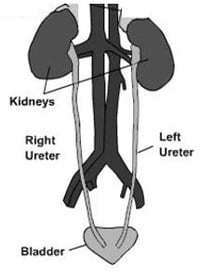What is ureteral reimplantation?
The funnel-shaped tubes that carry urine from the kidneys to the bladder are called ureters. The tubes are supposed to keep urine from backing up toward the kidneys. With vesicoureteral reflux (VUR), urine may back up into the kidneys. This back up can cause infection to go up to the kidneys.The surgery to fix the tubes is called ureteral reimplantation.

What do I need to know before my child’s surgery?
A nurse will call you 1 to 3 days before your child’s surgery. The nurse will go over instructions that need to be followed before surgery. The nurse will also tell you when your child has to stop eating and drinking. It is very important to follow these instructions. Surgery will be canceled if they are not followed. This is for your child’s health.How is the surgery done?
A cut is made in the lower abdomen. The surgeon will re-insert the ureter into the bladder. This will keep urine from flowing back into the kidney. Most often your child will be in the hospital for 2 to 4 days after surgery.
How do I care for my child after surgery?
Diet
- Your child may not be hungry for the first 1 to 2 days after surgery. Your child may have an upset stomach. The nurses and doctors will keep a close watch on this.
- Fluids will be given through an IV. Clear liquids will also be offered.
- Once your child is hungry and passes gas, more solid foods can be given.
Activity
- After surgery, you may hold your child. This is often very comforting for younger children. Do not worry, as you will not hurt the wound. Because there is an IV and often tubes and wires, the nurses will help you.
- Older children may be up and walking once they feel like it. This often happens within a couple of days. It may be painful to get up at first, but your child will feel better once they have been out of bed.
- Your child should not play heavy or rough sports after surgery. Their surgeon will tell you when your child can start their normal activities again.
Wound Care
- Dressings will be on the wound. These will be changed during the hospital stay or when your child is discharged.
- The nurses will teach you how to care for the wound if your child has a drain or tube.
- Most of the stitches will dissolve on their own. The stitches around the drain or tube site will have to be removed. This will be done in the office.
- A firm ridge often develops under the wound. This is normal. It will slowly go away over the next several weeks to months. Bruising and minor spotting of blood are also common.
- Your child will go home with a dressing. This is normally removed after a week.
- Your child may shower the day after surgery and take a bath 1 week after surgery, but it may be easier to wait until any tubes have been removed.
Catheter Care
- Your child will have a urine catheter after the surgery. In most cases, the urine coming out will look quite bloody. Even a little bit of blood in the urine will turn it quite red. It is very rare that a large amount of blood is being lost. The nurses and doctors will be checking this. The doctor will decide when the catheter will be removed. Often the urine will still be a little bloody after the catheter is removed. It may take about 3 to 4 weeks to clear up.
- Bladder spasms may happen and cause some discomfort. Infants will often suddenly pull their legs up and start crying. Older children will feel like they have to pee. Sometimes leakage around the catheter occurs. If this happens to your child, let the nurse know. Medicines can be given to help control the spasms.
Complications may include
- Wound infection or bleeding.
- Blockage of the ureter is rare, but may require more surgery.
- Continued reflux can happen to a small number of patient (2 to 10 out of 100). This will depend on how complex of a repair is needed. More surgery may be needed.
Follow-up
Follow-up will be arranged with your doctor when your child is discharged.
Pediatric Urology:
Monday – Friday 8:00am – 4:30 pm (414) 266-3794
Monday – Friday 4:30pm – 8:00am and weekends (414) 266-2000 ask for the Urology Resident on call



